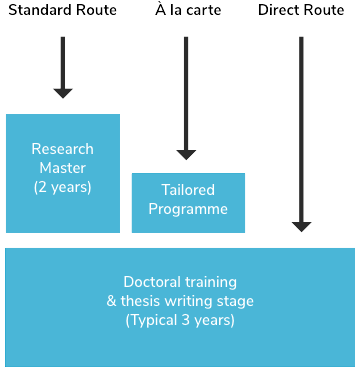Program description
The ECARES doctoral school is interested in talented and creative individuals who will be able to push the knowledge frontier in their chosen fields and contribute to policy and practice at the highest level.
For these reasons, our admission process is highly flexible to ensure we do not miss out on high quality applicants who may not have a standard background.
There are three entry routes into the Ph.D. programme at ECARES. See here for the application procedure:

- The standard route consists of taking one of the two research master programmes: Economics or Economics & Statistics described below (2×60 credits). During the first year the students follow courses in macroeconomics, microeconomics, econometrics, and statistics. In the second year students do field courses, write a first scientific paper and attend the research seminars.
Students who complete one of these programmes with an average of 14/20 or above and no grade under 12/20, and who found a Ph.D. supervisor are automatically accepted into doctoral training and the thesis writing phase.
Admission to the research master programme is competitive and we expect high prior academic achievements and strong quantitative background (minimum 180 ECTS or equivalent), but we do not require that the prior degree is in economics or statistics. - The à la carte route is designed for students who have completed at least 30 ECTS of advanced (= Ph.D. level) courses at another institution. These students can be admitted with an individualized programme of 60 credits designed to complete their past training and provide them with the required advanced training (at the level of the research master programmes) to continue into the Ph.D. within a year from their admission (conditional on achieving an average grade of 14/20 and no grade under 12/20).
- The direct route is designed for students with advanced prior training in economics and statistics at the level of the research masters and who have already a supervisor at ECARES. They can directly enter the doctoral training and writing phase.
Years 1-2
The first two years towards a PhD degree constitute the Research master. At ECARES, there are two programs: the Research master in Economics and the Research master in Economics and Statistics.
See here for the detailed program.
RESEARCH MASTER IN ECONOMICS:
The official name of the program is Master en sciences économiques, orientation économétrie – finalité Research in Economics – M-ECOER
Students that have already finished another Master Program, might get waivers for courses that are equivalent to courses of our Research Master. This is determined on a case to case basis.
RESEARCH MASTER IN ECONOMICS AND STATISTICS:
The official name of the program is Master en sciences économiques, orientation économétrie – finalité Research in Economics and Statistics – M-ECOES
Students that have already finished another Master Program, might get waivers for courses that are equivalent to courses of our Research Master. This is determined on a case to case basis.
In the second year there are two required courses and then students can choose between 2 and 4 optional courses.
Years 3-5
Depending on the performance during the first two years, students are allowed to the thesis writing phase (doctorat) of the PhD programs.
During this phase, the students work on the essays of their PhD-thesis under the supervision of an ECARES member (co-supervision with professors from other universities are possible). During the thesis writing phase, we expect every Ph.D. student to write at least one research paper per year, to present it in the internal seminar, and to actively participate in the seminar series. This does not only give students the chance to meet other researchers, but also to improve their presentation skills.
We actively help students to visit foreign universities for periods between one month and one year. We also strongly encourage students to attend summer and winter schools and follow advanced field courses. They are also most welcome to take their own initiatives and create, e.g. reading groups or short topical courses.


